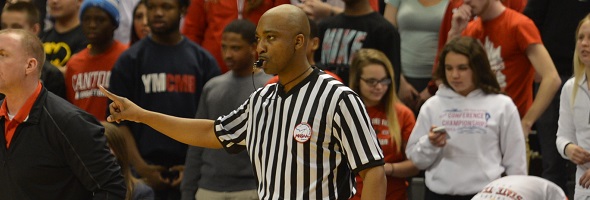
Be the Referee: Untimed Down
October 13, 2016
This week, MHSAA assistant director Mark Uyl discusses untimed downs in football, a hot topic given a scenario involving one of our in-state universities earlier this season.
Be The Referee is a series of short messages designed to help educate people on the rules of different sports, to help them better understand the art of officiating, and to recruit officials.
Below is this week's segment – Untimed Down - Listen
A few weeks back, the Central Michigan-Oklahoma State football game generated a lot of conversation about the playing rules when any period gets extended with an untimed down.
Many times announcers will wrongly talk about an accepted defensive penalty, that it then means the offense gets one more snap. Under high school rules, whenever there’s an accepted penalty on the last play of the period, there is one untimed down. The only exceptions to this – just like the college rules – are those penalties which also bring about a loss of down.
NOTE: Penalties which bring about a loss of down are: Intentional Grounding, Illegally Handing Ball Forward, Illegal Forward Pass and Illegal Touching.
Past editions
October 6: Soccer Penalty Kick Change - Listen
Sept. 29: Preparation for Officials - Listen
Sept 22: You Make the Call: Returning Kickoffs - Listen
Sept. 15: Concussions - Listen
Sept 8: Equipment Covering the Knees - Listen
Sept. 1: Play Clock Experiment - Listen
Aug. 25: Clipping in the Free Blocking Zone - Listen

Be the Referee: Block/Charge Calls
February 4, 2016
This week, MHSAA assistant director Mark Uyl clears up the confusion concerning what is required for a charge to be called in basketball.
Be The Referee is a series of short messages designed to help educate people on the rules of different sports, to help them better understand the art of officiating, and to recruit officials.
Below is this week's segment - Block/Charge Calls - Listen
Today we’re going to talk about one of the great myths in all of basketball rules that a defensive player must be completely stationary to take a charging foul against an offensive player either on the drive or on the dribble.
The reality is that a defender only has to obtain what is called a legal guarding position. A legal guarding position is when the defender is facing the offensive player and has essentially beaten him or her to that spot on the floor.
Once the defender is in this legal guarding position, the defender can be moving, and can even have one or both feet off the floor at the time that contact occurs.
Past editions:
Jan. 28: Dive on the Floor - Listen
Jan. 21: Hockey Officials' Options - Listen
Jan. 14: Recruiting Officials - Listen
Jan. 7: Wrestling Weight Monitoring - Listen
Dec. 31: Respect for Referees - Listen
Dec. 24: Basketball Instant Replay - Listen
Dec. 17: Basketball Communication - Listen
Dec. 10: Basketball Excessive Contact - Listen
Nov. 26: Pregame Communication - Listen
Nov. 19: Trick Plays - Listen
Nov. 12: 7-Person Football Mechanics - Listen
Nov. 5: Make the Call: Personal Fouls - Listen
Oct. 29: Officials Demographics - Listen
Oct. 15: Make the Call: Intentional Grounding - Listen
Oct. 8: Playoff Selection - Listen
Oct. 1: Kick Returns - Listen
Sept. 24: Concussions - Listen
Sept. 17: Automatic First Downs - Listen
Sept. 10: Correcting a Down - Listen
Sept 3: Spearing - Listen
Aug. 27: Missed Field Goal - Listen

